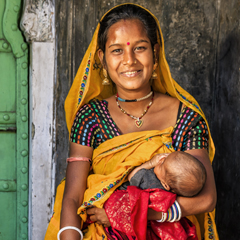
Total Awarded: $11,516,000
Duration: June 2015 - present
Total Grants: 28 grants
Geographic Focus: India
Background
The Foundation has a long history of working to improve population and reproductive health (PRH) around the world. During the 1994 International Conference on Population and Development, the Foundation supported a paradigm shift in the field of reproductive health from population control to sexual and reproductive health and rights. Since then, the Foundation has worked on PRH across several countries, having established its PRH program in India in 2003. In recent years, India has experienced widespread improvements in access to health care, including maternal health services. However, maternal morbidity and mortality rates remain high, suggesting that further improvements in access to maternal health care are unlikely to generate significant improvements in health outcomes. To accelerate reductions in morbidity and mortality rates, other issues besides access—particularly quality of maternal health care—must be addressed.
What We Evaluated
Responding to this need, the Foundation launched a four-year (June 2015– September 2019) maternal health quality of care (MHQoC) strategy in June 2015, which aims to catalyze another paradigm shift, this time in the maternal health arena within India—changing the focus from increasing access to maternal health services to improving the quality of these services. The MHQoC strategy marks the final stage of the Foundation’s grant-making to support PRH in India and seeks to build a foundation and momentum for further maternal health quality improvements after the Foundation exits the country. To this end, it includes three key sub-strategies: (1) strengthening the supply of quality maternal health services in both the public and private sectors, (2) building demand for quality services through accountability mechanisms, and (3) building evidence and supporting advocacy for quality maternal health services. To carry out the work of the strategy, the Foundation has funded 20 grantees through 28 grants. The grants’ work spans 16 of India’s 29 states and addresses a variety of maternal health topics within the three sub-strategies. These grants will conclude at different times, with the last ending in September 2019. To measure progress toward the strategy’s goals, the Foundation engaged an evaluation partner, Mathematica Policy Research. Mathematica completed its first phase of evaluation in 2018. This report summarizes achievements or challenges to date along each sub-strategy, providing context to understand progress during this period whenever possible.
What We Learned
Supply sub-strategy: Defined quality assurance (QA) standards provide a uniform tool to help facilities achieve quality improvements; a culture of mentorship and continuous QA and quality improvement helps to maintain quality.
Demand sub-strategy: Community accountability mechanisms have gained traction in some areas, but best practices for ensuring institutional responsiveness to community-led monitoring and planning efforts are still emerging.
Advocacy sub-strategy: Policymakers have an appetite for evidence.
Cross-cutting
- Identifying and translating key elements of emerging program models and their relevance to other contexts are necessary steps to bringing these programs to a wider audience.
- Sustainability is a challenge for many nongovernmental organizations because they have limited capacity to incorporate it in their planning as a core program component.
- Aligning maternal health quality activities with priorities of the Indian government and other key decision makers can promote their engagement and uptake of activities. However, some circumstances may require a separate entity to drive catalytic change.
Midline Evaluation of Maternal Health Quality of Care Strategy in India ›
Landscape Evaluation of Maternal Health Quality of Care in India ›
MacArthur's evaluation philosophy ›



